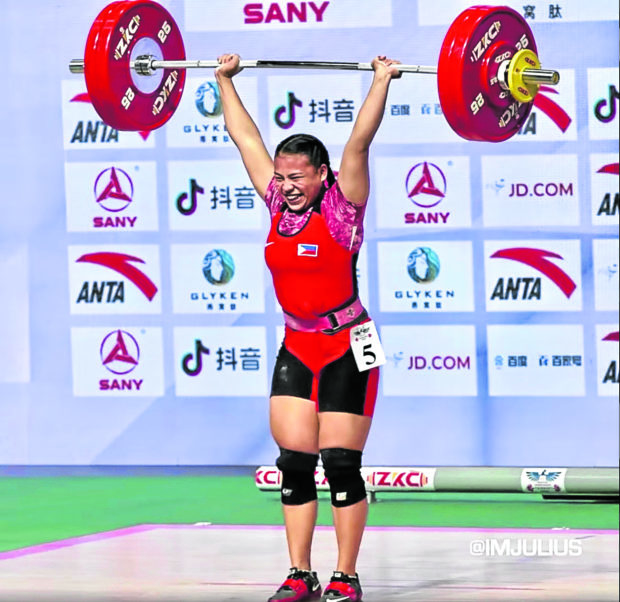Weight of the world

The joy of victory is evident in Vanessa Sarno’s smile. —SCREEN GRAB FROM COACH JULIUS NARANJO’S INSTAGRAM ACCOUNT
She had sealed the gold medal in the Asian championships with a 124-kilogram lift in the clean and jerk with an attempt to spare. For that remaining attempt, Vanessa Sarno’s coaches prodded her to go for 128 kgs.
Not only was it a huge jump in weights, but Sarno’s personal record was at 125 kgs. At the urging of her coaches, Sarno decided to give it a go.
“I just took it a step at a time,” she told the Inquirer in Filipino on Friday. “Just get the barbell to my waist first. If I could get it there cleanly, I knew I could finish the routine.”
If only life were as easy to deal with.
At 17, Sarno found out that barbells and personal records, you can train for. Fathers who tell their children that nothing good would come out of pursuing their passions? Nothing can prepare you for that.
“It hurt a lot when he told me that I wouldn’t get anything out of weightlifting,” she said via a phone call from Tashkent, Uzbekistan, which hosted the recent continental weightlifting championships.
Family problems
Luckily, she bounces back from discouragement easily. When she lost her spot in the national team in 2017, she had almost given up on weightlifting. But it didn’t take too hard for her coaches to coax her back to competition.
She giggled and then burst into laughter before revealing what convinced her to return to training: “They told me that in the next competition scheduled, my crush would be competing, too.”
Still, her problems with her father were a lot to handle, especially at her age, and not even the choppiness of an unsteady call connection could hide her emotion as she told her story.
“He also left us,” she said. The development pushed the teenager at the forefront of taking care of the family. She felt the weight of the world on her shoulders and to help her with it, she turned to her world champion in lifting burdens—her mother, Emelita Palomar Sarno.“She takes care of us, but I have to help her,” Sarno said, revealing how Emelita helps her sister, Vanessa’s aunt, sell fish, for which she is given a share of whatever earnings they can muster. It got to the point that her family piled up debts and they would miss meals.
Luckily, there were people around her always willing to help.
Coaches Nicolas and Liza Jaluag had been training Sarno since she was eight or nine. Sarno had joined her cousins in the couple’s gym just as a means to pass time. “Gadgets were not a fad then,” she said, “unlike now when it’s hard to get kids into sports because they’re always with their gadgets.”
“Even as a child she trained really hard,” said Liza, herself a decorated weightlifter and former internationalist.
The Jaluag couple are more than coaches for Sarno.

Emelita Sarno (middle, top row) helps sell fish to take care of her children (clockwise from right) Vanessa, Veronica, Vincent and Van Leslie. —PHOTO COURTESY OF VANESSA SARNO
“There was a time when I almost blacked out because I hadn’t eaten yet. They gave me money so I could buy rice for my family. They gave me other food too. My mom was so happy when I got home from training because we had food to eat,” Sarno recalled.
Junior and senior champ
While her allowances as a national athlete now help feed her family, her victory in Tashkent—aside from the clean and jerk gold, she won the overall gold medal in her weight division (71 kg)—will wipe out some of her money problems.
The law guarantees her P500,000 for her overall gold medal and Samahang Weightlifting ng Pilipinas president Monico Puentevella said she will be receiving more incentives.
“She deserves it,” Puentevella told the Inquirer. “She’s a strong girl, a fighter, and she is a medal bet for the 2024 Olympics in Paris.”
“Imagine, she is the junior champion in her division and now, she is also the senior champion,” added Puentevella.
We often pin our aspirations of national glory on our athletes, believing that the country’s pride is enough for them. It is, but they have other dreams, too.
“I want my family to have our own house,” said Sarno, who lives in Tagbilaran City in Bohol province, but prefers to call Dauis home.
“She has gone through a lot,” said Liza. “And we remind her to strive hard for her family.”
So far, her work ethic is unquestioned.
Meticulous
Last year, she prepared for an online world tournament by training at 4 or 5 in the morning—she wasn’t just training to lift her target weights, she was also training for the time zone.
“The competition was hosted by Peru and the time of my competition here was at 5 a.m.,” she said. “It was hard because sometimes I would be really sleepy.”
She is meticulous too. In Tashkent, she immediately scoped the opposition, rifling through the start list to check her rivals’ personal bests.
“I saw that my numbers were good for third place,” Sarno said. “So I called my mother and said not to expect much.”

Vanessa Sarno during the
awarding ceremony in Tashkent,
Uzbekistan. —INTERNATIONAL
WEIGHTLIFTING FEDERATION
SCREEN GRAB
Besides, it was her first time competing against senior-level foes internationally. “My opponents were all older than me,” she said.
But what a first time it turned out to be. And after winning the gold, Sarno called her mother right away.
“We won,” she told the 47-year-old Emelita, who was ecstatic.
And yes, she did manage to lift the 128-kg final attempt. And as she held the barbell above her head, she flashed a bright smile that showed she never doubted herself.
Why would she? She’s carried a heavier weight in life before. INQ
